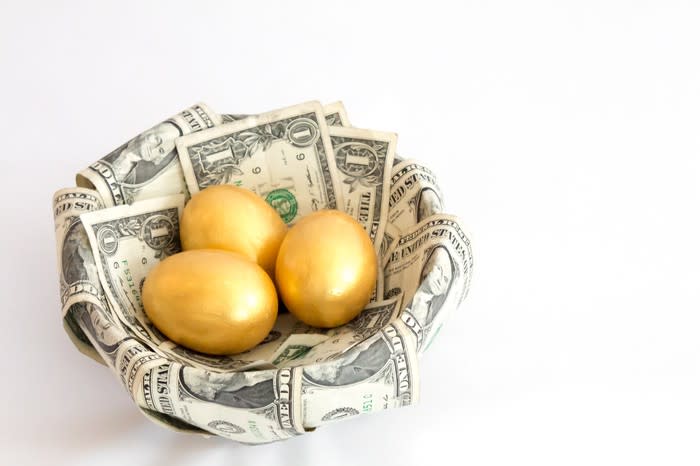The Most Surprising Thing About Warren Buffett's Investing Strategy
For long-term-oriented investors, Warren Buffett is something of an icon. In less than seven decades, he took roughly $10,000 in seed capital and turned it into more than $79 billion in net worth.
However, Buffett hasn't needed fancy computers, technical analysis, or any quantitative analysis to figure out which stocks to buy. Rather, he's stuck to the simple investing strategy of looking for businesses that have sustainable competitive advantages, and buying those companies when he perceives them to be trading at a discount. Buffett has been the CEO of Berkshire Hathaway (NYSE: BRK-A)(NYSE: BRK-B) for nearly 50 years, and when he buys stock, he tends to hang on for years or decades at a time. The average top-10 holding of Berkshire Hathaway has been held for 7.5 years.
According to Berkshire Hathaway's 13F filing with the Securities and Exchange Commission last week, Buffett's company had more than $208 billion in assets under management. Not to mention, Berkshire Hathaway has acquired about five dozen companies throughout the years from a variety of sectors and industries.

Berkshire Hathaway CEO Warren Buffett at his company's annual stockholder meeting. Image source: The Motley Fool.
Buffett isn't a big fan of diversification -- if you know what you're doing
But the fact that Buffett has been successful simply buying and holding great businesses isn't the most surprising thing about his investing strategy. What's truly eye-opening is the lack of diversification in Berkshire Hathaway's investment portfolio.
As of the end of June, Berkshire Hathaway owned a stake in 47 securities, some of which represent different classes of stock from the same company. Yet Buffett's portfolio was highly concentrated in three sectors, as well as five individual stocks.
Based on information aggregated by WhaleWisdom.com, 47.37% of the Oracle of Omaha's invested money is currently tied up in the financial sector. That probably shouldn't be a surprise, as big banks and insurers have been mainstays in Buffett's portfolio for decades. However, the 47.37% allocation in the second quarter of 2019 is the highest weighting the financial sector has been given in Berkshire's portfolio since the end of the third quarter 2006 (47.38%).
Information technology is the second largest holding in Buffett's portfolio, representing 24.2% of invested capital at the end of June. Dating back to the beginning of 2001, the 24.2% tied up in tech is the third highest weighting for Berkshire Hathaway in a single quarter, trailing just the 24.23% in Q1 2019, and 26.75% in Q3 2018.
Lastly, consumer staples made up 15.23% of Berkshire Hathaway's portfolio, as of the end of the second quarter. Unlike financials and tech, Buffett's favorability toward consumer staples has waned to its lowest level in 18 years during the most recent quarter.

Image source: Getty Images.
Nonetheless, these three sectors comprise 86.8% of Berkshire Hathaway's $208 billion in invested capital.
Though we're usually taught, as investors, about the importance of diversification, Buffett's belief is as follows: "Diversification is protection against ignorance. It makes little sense if you know what you are doing." By focusing nearly all of his effort and attention on these sectors, Buffett believes he'll be able to more accurately identify those businesses that offer long-term competitive advantages. And, clearly, his track record speaks for itself.
Buffett's five biggest holdings
As noted, it's not just that Buffett has close to 87% of his company's invested capital in three sectors. He also has just shy of 65% of Berkshire's assets under management in five of the company's 47 holdings (data from WhaleWisdom.com):
Apple (NASDAQ: AAPL): 23.7378% of portfolio.
Bank of America (NYSE: BAC): 12.9217%.
Coca-Cola (NYSE: KO): 9.7876%.
Wells Fargo (NYSE: WFC): 9.3185%.
American Express (NYSE: AXP): 8.9931%.
Consistent with the earlier data, Buffett and his investing team really like the financial sector. Although it is prone to weakness during periods of interest rate and economic contraction, it's often been the backbone of an expanding U.S. economy. And last I checked, the U.S. economy spends far more time expanding than it does in recession.
In the latest quarter, Buffett added more than 31 million shares of Bank of America, bolstering the market value of the position to almost $26.9 billion. Bank of America has reduced its brick-and-mortar branch exposure, upped its digital offerings to reach millennials, and kept itself out of trouble for years. As a result, it remains one of the cheapest big banks, even after a significant run higher.

Image source: Getty Images.
Wells Fargo, despite its recent scandal, has been as consistent as they come in the banking industry for decades. First added to Berkshire's portfolio 30 years ago, Wells Fargo has consistently delivered a superior return on assets, relative to most money-center banks, and has always done well in attracting more affluent clientele.
Speaking of affluent clientele, there's American Express in the No. 5 spot. American Express gets the benefit of double-dipping during periods of economic expansion. It charges merchants on its network a transaction fee, then also has the opportunity to collect interest on AmEx cardholders that carry a balance on select credit cards. Affluent clients tend to be affected less when the U.S. or global economy "hiccups," making American Express an intriguing long-term hold.
You've probably also noticed that Apple makes up pretty much the entirety of Berkshire Hathaway's information technology holdings. In fact, Apple almost represents a quarter of Buffett's invested capital. The company's massive war chest ($210.6 billion in cash and investments, as of the fiscal third quarter), its dominance in smartphones, and its ongoing innovation make it a company that Buffett has stated he has no intention of selling.
Lastly, there's consumer staple Coca-Cola, which Buffett has held for more than 30 years. Coca-Cola has geographic diversity, with a presence in all but one country (North Korea), and has numerous well-known brands that yield significant pricing power and generally predictable sales growth and cash flow. It also sports a healthy dividend yield.
In other words, just know that if you mirror Buffett's investing strategy, you're placing your eggs in only a few baskets.
More From The Motley Fool
Sean Williams owns shares of Bank of America. The Motley Fool owns shares of and recommends Apple and Berkshire Hathaway (B shares). The Motley Fool has the following options: short January 2021 $200 puts on Berkshire Hathaway (B shares), long January 2021 $200 calls on Berkshire Hathaway (B shares), short January 2020 $155 calls on Apple, long January 2020 $150 calls on Apple, short January 2020 $155 calls on Apple, and long January 2020 $150 calls on Apple. The Motley Fool has a disclosure policy.
This article was originally published on Fool.com

 Yahoo Finance
Yahoo Finance 